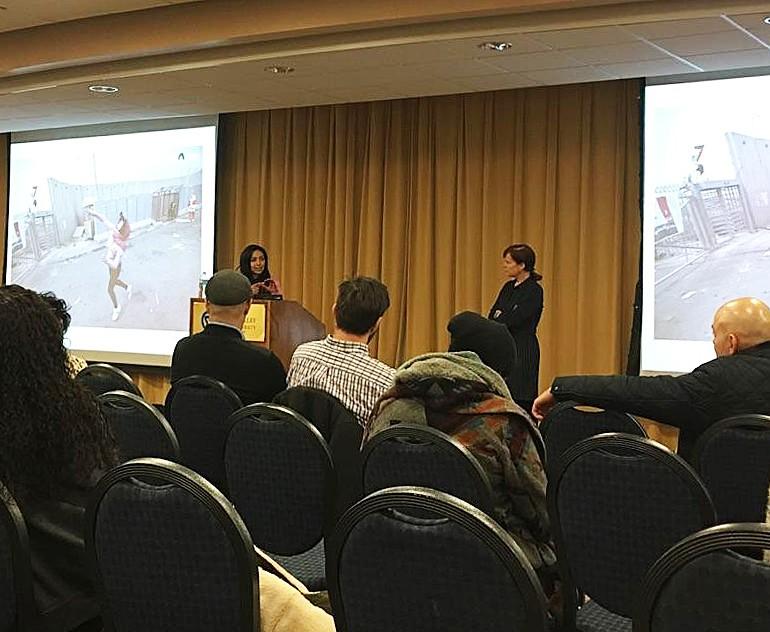Being a woman in Palestine

GVL/Megan Webster – Samah Saleh, associate professor of sociology and social work at An-Najah National University in Nablus, Palestine, speaks to students inside the Grand River Room in Kirkhof on Thursday, Feb. 16, 2017.
Feb 20, 2017
Using the analogy of a prison, Samah Saleh, associate professor of sociology and social work at An-Najah National University in Nablus, Palestine, illustrated a world in which Palestinian women are treated as objects rather than as human beings. While speaking in the Kirkhof Center Grand River Room Thursday, Feb. 16, Saleh captured the audience’s attention through anecdotes and images of what it is like to be a woman in Palestine during her lecture titled “Palestinian Women Under the Israeli Occupation: The Politicization of Everyday Life.”
Saleh’s lecture was hosted by Grand Valley State University’s Middle East studies in conjunction with the Michigan Model Arab League. In her introduction to the presentation, Coeli Fitzpatrick, a GVSU professor and the coordinator of Middle East studies, laid out Saleh’s credentials and achievements and explained the importance of her visit.
“Her research is constantly leading her in the direction of asking how people, mainly women and children, internalize the (Israeli) occupation and what sort of strategies they developed to resist and to have fortitude under the occupation,” Fitzpatrick said.
Saleh based her presentation on 27 interviews of Palestinian women that she conducted for her doctorate degree. The topic of discussion was the invasion and demolition of homes, the practice of Sumud and Palestinian women becoming activists in response to the actions against them and their homes.
“Women are experiencing a lot of politics within their home, a private space,” Saleh said. “They are listening to the news every morning and are watching different incidents. It’s not a matter of choice. It’s a matter of the everyday life.”
Saleh said it was quite common for the Israeli occupation to come into a home and completely destroy it. No matter what form of destruction the Israelis used, the house was typically unrecognizable by the end. When this happens, Palestinian families are permanently displaced from their homes and no longer own the land, effectively becoming homeless. Still, the streets are free of homeless families because the community has a large amount of resources available for these unlucky families. Saleh said the demolition of such a private space is a way to punish the occupants.
Nevertheless, Saleh said Palestinian women manage to stand up against the occupation by practicing Sumud, the exercise of peaceful nonresistance, and promoting nonviolence. They practice Sumud by keeping the actions of their everyday lives the same. They continue to do the things the Israeli occupation restricts them from doing.
“It’s not on the part of shooting anyone,” Saleh said. “It’s to know how to love, to know how to deal with this everyday life.”
Along with the constant practice of Sumud, the women of Palestine also find a way to break the borders. Saleh said the women don’t allow the physical and metaphorical borders erected by the occupation restrict them from getting involved.
“How these women were involved is a question we can ask,” Saleh said. “I believe that women negotiate. There are borders around them, and it takes to know how to move outside of those borders. They are aware, like most Palestinian women are aware, of the borders around them. They are aware about everything. They know how to negotiate these borders.”

























